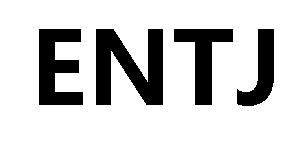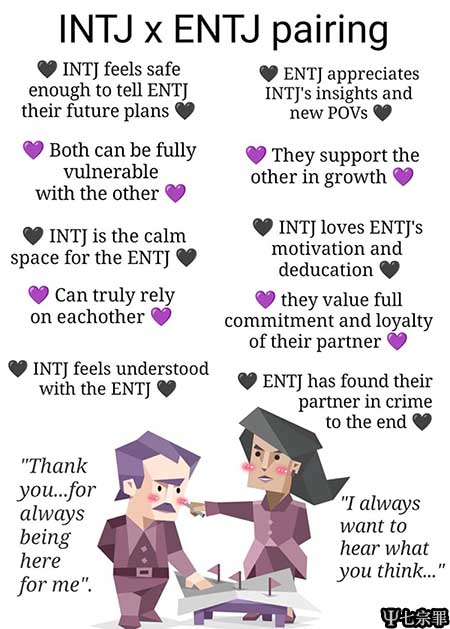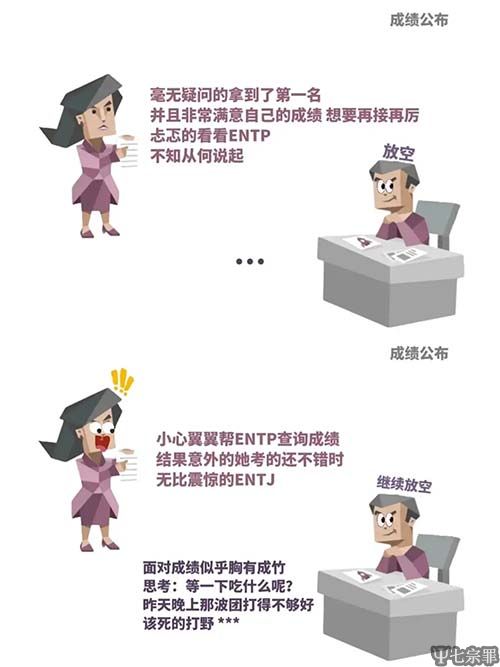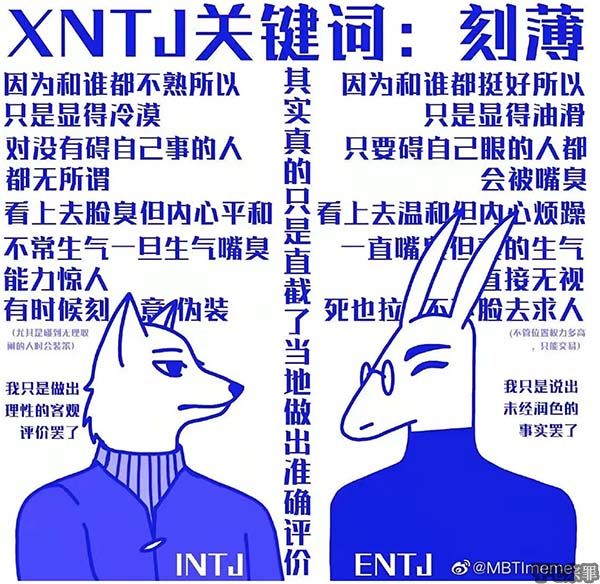ENTJ Personality Type
ENTJ人格型
ENTJs are born leaders. They are direct, assertive, and uninhibited. They can become frustrated and impatient when things don’t unfold according to their expected plan or time frame, evoking notions of the “Type-A” personality. In the presence of ENTJs, others may feel they are somehow being hurried or rushed, that the ENTJ wants them to “cut to the chase.”
ENTJ是天生的领袖,他们直接、果断、无所顾忌,当事情没有朝着他们预期的方向或规划发展时,他们会变得低落或者不耐烦,这些特点都很容易让人联想到健康心理学领域的“A型人格”。

当面对ENTJ时,大家通常都会觉得自己在被ENTJ催着往前赶,因为ENTJ总是希望人们能快点“进入正题”。
Like the ESTJ, ENTJs are firm, direct, and outwardly opinionated. At times, they may be seen as harsh, blunt, or insensitive. Despite outer confidence and imposing presence, they are, on the whole, no more inwardly secure nor sure of themselves than other types. In fact, because their inner Judging function (Fi) is inferior, they may feel they have relatively little inner control. Finding inner control elusive, they naturally turn their focus outwardly, hoping that achieving outer order and control will bring them inner calm and security. Of course, controlling the outside world is rarely an easy task, contributing to ENTJs’ propensity for restlessness and hypervigilance.
和ESTJ一样,ENTJ坚定、直接、固执己见,有时甚至被认为是过于严厉、生硬、冷酷无情的。然而,尽管ENTJ看上去很自信、充满威严,但他们也并不会比其他人格型更有内在的安全感或者自信心。
事实上,正是由于“内在判断功能(Fi)”是他们的第四功能,ENTJ反而会觉得自己的内部控制感较弱,而一旦感觉内部的控制难以捉摸,他们就会本能地把注意力转向外在的世界,期望外在的秩序和控制感能带给他们内心的平静与安宁感。但控制外部世界也并不是一件容易的事情,这就导致了ENTJ躁动不安与过度警惕的倾向。
Unlike the ENFJ, ENTJs don’t enjoy ready access to the interpersonal benefits conferred by Extraverted Feeling. Instead, they rely on their sense of humor, fueled by their auxiliary function, Introverted Intuition (Ni), to ingratiate themselves to others. ENTJs can be great showmen and storytellers. Undeterred by conflict or controversy (they actually like being seen as edgy or provocative), they like to push the envelope, which at times can leave others feeling hurt or offended.
与ENFJ不同,ENTJ并不享受Fe所带来的人际方面的获益,相反,他们往往依赖Ni功能(内向直觉)的幽默感去与人交往。ENTJ可以是很好的表演家和演说人,他们并不惧怕冲突或者争议(实际上他们很乐意被看作是尖锐的或者挑衅的),他们做事往往不留余地、一逼再逼,有时可能会让他人感到受伤或被冒犯。
While ENTJs can be quite funny when the time is right, they are, on the whole, quite serious in their approach to life. Their dominant function, Extraverted Thinking (Te), confers a strong work orientation. As we will shortly explore in greater depth, Te seeks to impose order, rationality, and efficiency on the world and its operations. Therefore, like the INTJ, ENTJs are often drawn to science, or can at least appreciate the value of its standardized methods.
在合适的状态下ENTJ也可能是有趣的,但总体来说,他们对待生活的态度还是非常的严肃。他们的主导功能外向思考(Te),是一个工作导向的功能,正如我们将在后面深入讨论的那样,Te功能总是试图将秩序、理性和效率引入到世间万物及其运行规则中。
因此,像INTJ一样,ENTJ也往往很容易被科学吸引,或者至少他们都会很欣赏很认可科学研究方法的意义与价值。
One of the hallmarks of Te is its need for everything to be clearly defined, measurable, and quantifiable. This, in combination with their love for strategy and competition, can make ENTJs formidable strategists and executives. ENTJs are commonly found among CEOs heading for-profit companies.
Te的一个显著特点是:它需要所有的事物都被清楚地定义、度量与量化,这一点,再加上ENTJ对制定战略和与人竞争的热爱,使他们成为了强大的战略家和执行官。通常在盈利性公司的CEO中,很容易找到ENTJ。
Wealth and social status can also be motivating factors for ENTJs. This can be seen as deriving, at least in part, from their tertiary function, Extraverted Sensing (Se). Despite their status as Intuitives, ENTJs love worldly things. They are not opposed to luxury housing or extravagant vacations, just as long as these things are written into the Te budget. So while ENTJs certainly like to work hard, they can also play hard.
“财富”和“社会地位”等因素也会成为ENTJ的激励来源,某种程度上,这些激励可以看作是他们第三功能外向感觉(Se)的需求。尽管ENTJ被看作是直觉型人格,但他们的确也热爱世俗之物。他们并不反感奢华的住所或者昂贵的假期,(当然只要通得过他们Te的预算)。因此,尽管ENTJ工作起来确实很拼命,但他们玩起来也能玩得很疯。
ENTJ Personality Type Development & Functional Stack
ENTJ的人格发展与功能类型
ENTJs’ functional stack is composed of the following functions:
Dominant: Extraverted Thinking (Te)——主导功能:外向思考Te
Auxiliary: Introverted Intuition (Ni)——辅助功能:内向直觉Ni
Tertiary: Extraverted Sensing (Se)——第三功能:外向感觉Se
Inferior: Introverted Feeling (Fi)——第四功能:内向情感Fi
ENTJs’ type development can be broadly conceived according to three phases:
ENTJ的人格发展可以大致分为三个阶段:
Phase I (Childhood-20s)
阶段一(孩童期-20S)
This phase is characterized by the emergence and differentiation of ENTJs’ dominant function, Extraverted Thinking (Te). Even early in life, ENTJs are goal-oriented. They are ambitious and seek success in whatever they put their mind to. Taking their goals and responsibilities seriously, they typically do well in school and aren’t afraid to assume leadership roles.
这一阶段是ENTJ的主导功能——外向思考(Te)逐渐出现并显著化的过程,即使在人生的很早期,ENTJ就已经是目标导向型,他们野心勃勃,一心追求成功,对待自己的目标与责任认真而严肃,他们通常都在学校表现很好,丝毫不怕承担领导职务。
During this phase, ENTJs can seem particularly inflexible and opinionated. They are quick to make judgments and draw conclusions about the world. Since their Extraverted Thinking (Te) judgments are not yet being tempered by their auxiliary and tertiary Perceiving functions, they are especially prone to jump to conclusions.
在这一阶段,ENTJ似乎特别顽固、固执己见,他们会迅速地做出判断,给出结论。由于此时他们Te功能所给出的判断还没来得及被辅助功能和第三功能修正和补充,因此看上去非常容易下结论。
Phase I ENTJs differ markedly from Phase I INTJs. Since INTJs dominant function (Ni) is a Perceiving function, they tend to be more passive and take life less seriously than ENTJs. In Phase I, INTJs are more concerned with ingesting and digesting the world (Ni), while ENTJs are already focused on shaping and manipulating it (Te).
处于第一阶段的ENTJ与处于第一阶段的INTJ有着明显的不同,因为INTJ的主导功能(Ni)是一种感知型功能(而非判断功能),因此他们会比ENTJ要被动、对待生活的态度也不会那么严肃。在这一阶段,INTJ更专注于汲取信息、理解世界(Ni),而ENTJ则专注于塑造并操控世界(Te)。

Phase II (Late Teens-30s)
阶段二(青春期末-30S)
Once their dominant Te reaches a certain threshold of strength and dominance, ENTJs’ inferior function, Introverted Feeling (Fi), enters the picture and begins to play a more influential role. This can be confusing because Fi is not next in line in their functional stack. Its undue influence derives from its bipolar relationship with ENTJs’ dominant Extraverted Thinking (Te). Unfortunately, the influence of their Te peaks in Phase II of type development, which happens to be the same time they are making life-altering decisions about their careers and relationships. ENTJs’ Te-Fi tug-of-war will be elucidated later in this profile.
一旦主导功能(Te)训练到了一定的强度和支配地位,第四功能内向情感(Fi)便会开始进入到ENTJ的视线中,并逐渐扮演起更有影响力的角色。这可能会让人困惑,因为在功能排序中,第四功能Fi并不是下一个就首当其冲待开发的功能。
而第四功能Fi的重大影响还源自于它与主导功能Te之间的冲突,不幸的是,这一功能的影响力在ENTJ的第二阶段正好达到颠峰,而这一阶段又正是人们做出“职业选择”和“关系决策”的关键阶段。关于ENTJ的Te-Fi之间的激烈竞争我们将在后面的章节详述。
In addition to the increasing presence and influence of their Fi, Phase II ENTJs are also developing their auxiliary function, Introverted Intuition (Ni). As they encounter complex problems and situations that call for greater patience and reflection, they turn to their Ni for assistance. In doing so, they work to better see and incorporate the bigger picture (Ni) into their Te Judging process. As they develop their ability to assume different perspectives and to grasp the bigger picture, they become somewhat slower to judge and display more discernment and foresight in their decisions.
除了第四功能Fi的存在感与影响力不断增强以外,第二阶段的ENTJ也会进一步发展他们的辅助功能——内向直觉(Ni)。当ENTJ遇到了需要更多耐心与思考才能解决的复杂问题或情况时,他们会转而寻求Ni的帮助,在这个过程中,ENTJ也会越来越感受到Ni所带来的开放视野,并能更好地将Ni融入到Te的判断里。
随着ENTJ不断地培养自己接受不同观点、把握更大图景的能力,他们的判断过程会逐渐慢下来,也会在决策中展示出更强的洞察力和远见性。
Phase II ENTJs may also begin to differentiate and incorporate their tertiary function, Extraverted Sensing (Se). For ENTJs, Se represents a further relaxing and opening of their judgments. It helps them loosen their grip on life, tempering their need for constant outer control (Fe).
第二阶段的ENTJ也可能会开始区分并整合他们的第三功能——外向感觉(Se)。对ENTJ来说,Se代表了他们对Te判断功能的进一步放松和放开。Se能够帮助ENTJ适当地放松对生活的控制,同时缓解他们对于持续的外部控制的需求(Fe)。
Phase III (30s, 40s, & Beyond)
阶段三(30s,40s,及以后)
If all goes well and they are fortunate enough to enter Phase III, ENTJs become increasingly aware of the insidious ways of their inferior Fi. As they become more aware of their inferior and learn to function more healthily as ENTJs, they experience greater balance between their Te and Fi, as well as an increasing sense of peace and wholeness.
如果能一切顺利并幸运地进入到人格发展的第三阶段,ENTJ会越来越能知觉到他们第四功能Fi的隐秘存在感,而随着对Fi的知觉,他们会越来越像一个成熟的ENTJ那样健康地工作,他们会在Te和Fi之间感受到更好的平衡,也会越来越感觉到人生的安宁感和完整性。
ENTJs’ Dominant Function: Extraverted Thinking (Te)
ENTJ的主导功能:外向思考(Te)
Extraverted Thinking (Te) serves as ENTJs’ dominant and most preferred function. It undergirds their tendency to quickly express their judgments and opinions, to literally think (i.e., make judgments, conclusions, decisions, etc.) aloud. ENTJs speak before they listen, Judge before they Perceive. This can be both a strength and a weakness. On the one hand, it can make them strong and courageous leaders, while on the other, it can contribute to their being abrasive or controlling. It can also dispose ENTJs to advancing premature judgments and assertions. They may say things that, in retrospect, they would prefer to rescind, soften, or further qualify.
外向思考(Te)是ENTJ的主导功能,也是最偏好使用的功能,它强调快速地表达判断和观点,字面上理解就是大声地说出自己的想法(比如:判断、结论、决定等)。ENTJ往往“说先于听”、“判断先于理解”,这既是优点,也可能是缺点。
一方面,它能使ENTJ成为强悍而英勇的领袖,另一方面,它又可能会让ENTJ变成暴君或控制狂。Te还会使ENTJ过早地得出判断或结论,当ENTJ回顾往昔时,通常可能会说,如果当时不那样做、或者再多权衡一下就好了。
As mentioned earlier, Te strives to impose order and rationality on external world. It is quantitative in nature, pushing for objective standards and measurable goals. Rarely vague or ambiguous, it insists on clearly defined policies, plans, and procedure. Although their auxiliary Ni may contribute some degree of openness, ENTJs still expect things to be done according to their Te plans and guidelines. After all, if too much leeway is granted, they feel the system will not function at their desired level of rationality and efficiency.
像我们前面提到的那样,Te希望将秩序与理性引入外部世界,它追求可量化的、客观的标准、可度量的目标,它很少是含糊的、模棱两可的,它坚持定义清晰的政策、计划与步骤。
尽管ENTJ的辅助功能Ni会带来一定程度的开放性,但他们还是更愿意根据自己的Te去计划和指导事情,毕竟,如果留了太多回旋的余地,ENTJ会觉得整个体系将没办法按照自己所期望的理性和效率去运行。
Te also contributes to ENTJs’ work-orientation. As T-dominants, ENTJs are generally more serious and focused than they are relaxed or receptive. Even on days when they have no external obligations, they are quick to get to work on something. Like other types with a dominant Judging function, ENTJs are not good at relaxing and doing nothing.
Te也促进了ENTJ的工作导向,作为T型主导人格,ENTJ通常是严肃而专注的,而不是放松或易接纳的,即使是在那些没有外部事务的日子,他们也会很快地找到事情做,和所有主导功能为判断功能的人格型一样,ENTJ并不擅长自我放松、也没法忍受啥都不做。
ENTJs’ Auxiliary Function: Introverted Intuition (Ni)
ENTJ的辅助功能:内向直觉(Ni)
Like other Intuitives, ENTJs are future-oriented, always striving for something more. They are forward thinking and change-oriented, getting bored or restless when things seem too repetitive, straightforward, or mundane.
和其他直觉型人格一样,ENTJ也是“未来导向型”,永远在追求更多的东西。他们通常具有前瞻性、具有变革精神,因此当事情过于重复、简单或乏味时,他们会觉得无聊或烦躁。
Instead of thinking of their Ni in terms of “intuition,” which can sometimes have a feminine connotation, ENTJs may use terms like “instincts” or “going with their gut.” Unlike Ne, which tends to generate more options than it does firm solutions, Ni confers a higher level of convergence and singularity. Hence, ENTJs, as well as other NJs, often feel confident that their Ni answers or insights are trustworthy and reliable.
ENTJ并不把他们的Ni功能看成是一种“直觉”(这种用词似乎会带有一些女性意味),他们更喜欢形容为一种“本能”或者说“跟随内心”。不像Ne功能倾向于生产出更多的选择(而不是固定在某一种解决方案),Ni则具有更高程度的收敛性与独有性,因此ENTJ和其他NJ型人格一样,通常对自己的Ni答案与见解自信而信赖。
Like INTJs, ENTJs are not only are they blessed with the ability to isolate and analyze specifics (Te), but can also maintain a clear vision of the whole system (Ni), including its hierarchical structure and the interrelations of its constituent parts. Their proficiency with seeing both the big picture (Ni) and its specifics (Te) makes ENTJs masters of strategy, analysis, and planning.
和INTJ一样,ENTJ不仅具有提取和分析细节的能力(Te),还能对整个系统保持一个清晰的认知(Ni),包括层次结构、各部分之间的关系。这种对全局和细节的双重把控使得ENTJ成为了制定战略、部署、规划的大师。
Not only does a well-developed Ni make ENTJs better visionaries, but it can also temper their propensity to jump to premature conclusions. ENTJs can use their Ni to explore alternative perspectives and avoid the tunnel vision that may result from exclusive use of Te. Using and developing their Ni represents an important part of their personal growth, helping to ensure that their Te judgments are rooted in a broader, more comprehensive understanding.
一个发展良好的Ni不仅能让ENTJ更有远见,还能缓解他们仓促下定论的倾向。ENTJ可以使用他们的Ni去探索不同的视角,避免陷入到由于完全倚仗Te所导致的狭隘视野中。使用和开发Ni功能是ENTJ个人成长中非常重要的部分,这有助于确保他们的Te判断建立在一个视野更广、理解更全面的基础之上。
ENTJs’ Tertiary Function: Extraverted Sensing (Se)
ENTJ的第三功能:外向感觉(Se)
Extraverted Sensing (Se) is a sensual, instinctual, and appetitive function. Se types seek out novel sensations, physical thrills, and material comforts.
外向感觉(Se)是一种感官上的、本能性的、与世俗物欲有关的功能,Se功能追求新奇的感官体验、身体刺激和物质享受。
ENTJs can have a certain worldliness about them, enjoying novel sensations, experiences, and material acquisitions. They can be particular about the quality, appearance, and status of their homes and possessions. Like other NJs, they can be captivated by the finer things in life, including the allure and status of affluent lifestyles.
ENTJ具有一定的世俗性,他们喜欢新奇的感官刺激、体验和物质上的满足。他们可能会对自己的住所、财物的质量、外观、状态非常地讲究。和其他NJ型一样,ENTJ会被生活中所有美好的事物所吸引,这也包括了富有的生活方式和社会地位所带来的诱惑。
With that said, the fact remains that ENTJs are dominant Judgers, meaning that their Te work generally takes precedence over any Se concerns. So while ENTJs can enjoy Se goods and experiences, they may be slow to make time for them in their T-oriented schedule.
然而,总体而言ENTJ还是判断主导型人格,这意味着他们的Te往往会先于Se工作,因此,当ENTJ可以去感受一下Se所带来的外在享受与体验时,他们又可能会有些迟疑,因为要在以T为导向的行程中挤出时间来。
ENTJs’ Inferior Function: Introverted Feeling (Fi)
ENTJ的第四功能:内向情感(Fi)
As is true of other types, ENTJs can be blinded to the degree to which their inferior function impacts their decisions and behavior. Without adequate awareness of their inferior, they will continue to feel incomplete and be prone to unwise decision-making in their lifestyle, careers, and relationships. Consequently, ENTJs seeking self-knowledge and personal growth must work to understand the ways their inferior function, Introverted Feeling (Fi), manifests in their personality.
和其他人格型一样,ENTJ也可能会忽视第四功能对其行为决策的影响程度。如果始终缺乏对第四功能的足够重视,ENTJ会持续性地感觉不完整,并可能在生活、职业与人际关系中做出不明智的决定。
因此,对于一个想要寻求自我认知和个人成长的ENTJ来说,必须努力地去了解自己的第四功能——内向情感(Fi)在人格特质中所展现出的形式。
Fi involves an inner focus on personal feelings, tastes, and values. Of all types, IFPs are the most “self-focused” (in a neutral sense) with respect to their concern for exploring and managing their personal values and emotions. ENTJs, for whom Fi is inferior and largely unconscious, do not enjoy ready access to their personal feelings and values. As for other dominant Thinking types, emotions can be slippery and elusive for ENTJs. Therefore, in situations where a “socially appropriate” emotional response is warranted, ENTJs can feel quite uncomfortable, since their emotional experience is often relatively weak. They may then resort to using their Te to offer condolences, etc., which can sound a bit mechanical, terse, or otherwise inadequate in emotional situations. ENTJs may also develop strategies for repairing a bad situation, allowing them to escape the awkward task of emotionally supporting or connecting with others.
Fi功能涉及到对个人感受、审美与价值观的内在关注。在所有人格型中,IFP(主导功能为Fi)是最为“关注自我”的,他们关注于探索和处理个人的价值观与情感偏好。
而对于ENTJ这种Fi功能排在最末尾且最为无意识的人格型来说,他们其实不太关注个人的感受与价值观。就和其他T型主导的人格一样,ENTJ的情绪也往往来来去去、难以捉摸。因此,在一些需要“得体的社交”情绪反应的场合里,ENTJ会感到很不舒服,因为他们的情绪体验往往都很弱。
于是,他们可能会尝试用自己的Te来表达关怀,然而最终听起来还是会很僵硬、直白,或者至少也是在情感场合里不那么适宜的。
ENTJ也可能会发展出一些处理糟糕状况的独特策略,用来避免那些需要给别人提供情感支持或心灵联结的尴尬情况。
Fi is also concerned with the development of a system of personalized values and judgments, independent of societal conventions. This inner value system and personalized worldview grants IFPs a strong sense of inner confidence and control. ENTJs, by contrast, do not enjoy the same degree of inner confidence because of the inferior nature of their Fi. To compensate, they focus on managing and controlling the outside world. They instinctively sense that the best way of controlling themselves is through controlling their surroundings. This is precisely the opposite of the IFP approach. IFPs feel relatively powerless in their ability to control the outside world (Te) and respond by focusing on the one thing they can control—themselves (Fi).
Fi功能还涉及到一个独立于社会传统之外的的个人价值判断体系的建立。这种内在的价值体系与个人化的世界观赋予了“IFP型”强烈的内信心与控制感。相比之下,ENTJ就没有这么强的内信心,因为他们的Fi功能排名靠后。

为了弥补这方面的缺失,ENTJ会专注于对外在世界的控制与管理。他们会很本能地感觉到控制自我最好的办法就是控制周围的一切。这恰好与IFP型完全相反,IFP是在控制外部世界的能力(Te)上感到无能为力,于是专注于他们唯一所能控制的事物——他们自己(Fi)。
With that being said, it would be wrong to assume that ENTJs’ Fi is powerless or lacking in influence. While they may feel they experience relatively little conscious control over their Fi, it can still exert its influence through less conscious means. As I have written elsewhere, the inferior function can play a prominent role in informing and orienting the dominant function, influencing its values and objectives.
然而,如果因此就认为ENTJ的Fi是毫无力量的,那也错了,尽管ENTJ确实会觉得自己对Fi的控制感很弱,但Fi仍然会通过一些不那么有意识的方式发挥其影响力。正如我在其他书里写的那样,第四功能在激励和促进主导功能上可能发挥出巨大的作用,影响其价值判断与目标取舍。
More specifically, ENTJs’ Fi might compel them to work toward a cause that has personally affected them. For instance, an ENTJ whose parent died of a rare disease may decide to become a physician or medical researcher. Their Fi might also lead them to place greater importance on the role of children and family in their lives than one might expect from a dominant Thinking type. This is not to say, however, that it is a good thing for ENTJs to be ruled or overtaken by their Fi. To the contrary, ENTJs, not to mention society as a whole, are better served when they engage in work that capitalizes on their Te-Ni strengths.
更具体地说,ENTJ的Fi功能可能会使他们选择一个对自己来说具有私人意义的事业,例如,一个父母死于罕见疾病的ENTJ可能会决定成为一名医生或医学研究者。同时,Fi还可能会让ENTJ更重视孩子与家庭在他们生活中的地位,而并不像人们所以为的主导功能为Te的人那样。
然而,这也并不是说ENTJ被他们的Fi统治或支配是一件好事,相反,ENTJ还是在使用他们的优势功能“Te-Ni”组合时,能更好的发挥作用(在整个社会层面上也是如此)。
It is also critical that ENTJs consider how they are using their Te. Like other dominant Judgers, ENTJs can be prone to a sense of urgency when it comes to making decisions or finishing tasks. This sense of urgency can lead to premature and erroneous judgments, lower quality work, and obsessive sorts of behavior. For instance, ENTJs may have in mind for what they want to accomplish on a given day, only to discover the project to be much larger than they originally conjectured. But since larger task poses a larger challenge, they may “take the bait” and see if they can still manage to finish it. One of the problems with doing so is it locks them into Judging mode, as any deviation into Perceiving would likely prevent them from achieving their goal in the specified time frame. It might also lead them to shut out other people, who are then viewed as intrusions or impediments to their objectives.
对ENTJ来说,考虑如何正确地使用Te非常重要。和其他判断型人格一样,ENTJ通常会在做决定或任务时产生一种紧迫感,这种紧迫感会导致ENTJ过早的决定、错误的判断,甚至降低工作质量、出现一些偏执的行为。
比如,ENTJ可能会提前规划好在特定的时间完成特定的任务,结果却发现工作量比他们最初预想的要大得多,但又因为更大的任务往往会带来更大的挑战,他们便会立马“上钩”,一定要看看自己能否办得成这件事。
这种行为模式所导致的最大问题是,它会将ENTJ锁死在判断状态(Te)中,因为此时任何感知上(Ni)的偏差都将可能会阻碍他们在指定的时间实现目标,于是,他们将极有可能把所有人都拒之门外,并把这些人看作是他们目标的干涉者和阻碍者。
To function more healthily, ENTJs need to ensure they are spending adequate time Perceiving rather than racing to finish things. While acknowledging their desire to reach a point of closure, ENTJs can benefit from remaining open to alternatives, realizing that Perceiving infuses their life with texture and richness. It allows them to live more organically, rather than always clinging to a preset agenda. This is not to say that ENTJs should stop being ENTJs and transform into ENTPs, but involves finding the right balance between Judging and Perceiving.
为了更健康地运转,ENTJ需要确保他们有花足够的时间去观察和感知事物,而不是匆忙地去做事情。
尽管我们能够理解ENTJ迫切想要完成任务的心情,但如果ENTJ能够保持更开放的状态,他们将能从中受益,并能意识到“增强感知性”能给他们的生活注入更多的色彩与多样性,会使他们的生活变得更有弹性,而不是总待在一层不变定的定式里。
当然,这也并不是说ENTJ就应该转变成一个ENTP,而是他们要学会在“判断(J)”与“感知(P)”之间找到更好的平衡。
1. ENTJ(外倾、直觉、思维和判断)—— 一切顺利,因为我一手掌握 MBTI十六型人格
2. MBTI中不同的性格都有哪些之最? INTJ最可能避免依赖他人
 七宗罪心理
七宗罪心理













